
THE MYTH MAN'S
MYTH OF THE MONTH
February

APHRODITE
Goddess of Love, Beauty, Fertility & Desire
(Roman name: Venus)

THE MYTH MAN'S
MYTH OF THE MONTH
February

APHRODITE
Goddess of Love, Beauty,
Fertility & Desire
(Roman name: Venus)
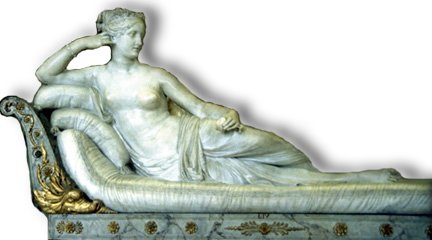
by Nick Pontikis
(with apologies to grandpa Hessiod and uncle Homer)
| My second
cousin Aphrodite was the Greek goddess of love,
beauty, fertility and desire, and was rumored to be the
oldest of the twelve Olympian gods. (Hey, I wasn't about
to ask her age...are you crazy?) If you thought Athena's birth was rather odd, springing as she
did full-grown out of the head of Zeus, wait until you
hear about how the proud, gorgeous (and often cruel)
Aphrodite came to be! (But first send the little ones to bed - some content may be inappropriate for younger readers.) Cronus was the son of the great god Uranus (Heaven, Sky) and Gaia (Mother Earth). I vaguely remember them, I was so young when they died...The stories I heard at grandpa Hesiod's knee say that as his children were born, nasty old Uranus went and imprisoned them so they wouldn't challenge his rule, causing Mother Earth great grief. You should never mess with Mother Earth, boys and girls... With his mother's help (and a very sharp sickle!) Cronus ambushed his father and castrated him. Ouch! Hate when that happens...Cronus threw Uranus' severed parts into the sea, and a host of giants and nymphs arose from the water, including cousin Aphrodite. Man, my cousin always knew how to make an appearance...Aphrodite ("Afros" is Greek for "foam of the sea") emerged naked from the foam and stepped ashore at Cyprus or Cythera, we're not sure. (People were so stunned at her beauty, they forgot where they were, the story goes.) Incidentally, some say the goddess of desire's connection with water may be one reason seafood has been considered an aphrodisiac throughout the ages. Grass and flowers sprang up wherever her feet touched the earth. The Seasons clothed, perfumed and covered her in jewels, and brought her before the Immortals. It was the hottest ticket in town. "APHRODITE DEBUTANTE!" screamed the headlines of the Mount Olympus Chronicle. Gods and mortals alike were in a frenzy, getting their hair done and ordering spiffy new togas from Niko of Athens and Ermani of Patra for the coming-out ball. |
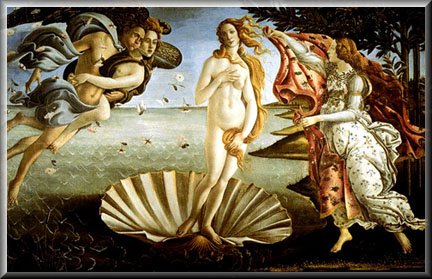
| That's the story
of Aphrodite's birth according to grandpa Hesiod, circa
800BC. Uncle Homer, on the other hand, in the Iliad
claims that she was the daughter of Zeus and Dione.
Boring version, unc. Stick to the war stories, will ya? From these two different origins, my philosopher cousin Plato (man was he cerebral, you asked him what time it was, he told you how to build a sundial...) identified two Aphrodites. One, the daughter of Uranus, also called Urania, was the noble goddess of pure love. The kind of girl you didn't mind sending a dozen roses to on impulse, dinner, candlelight, music, the works. The other, the daughter of Dione, also called Pandemos, was the goddess of 'common' love. She could be a real *itch, if you know what I mean, pardon my Greek. (Hey, you want me to lie?) Conniving Aphrodite in her Pandemos persona broke up many a decent Hellenic home. My mailman Hermes tells me she's now taken up residence in a place called Washington, DC. I think it's near Hades. So who to believe, gramps or unc? In this instance, I prefer grandpa Hesiod's version of Aphrodite's origin, it's so much more credible. Besides, grandpa Hesiod always told the neatest stories! Sometimes, though, I swear he was making stuff up just to amuse us kids. And talk about a plum job! As a goddess, Aphrodite had only one divine duty: to make love and to inspire others to do so as well. Her primary function was to preside over reproduction, ensuring the survival of the community. Hard work, but hey, someone's got to do it. Where do I apply? Aphrodite was desired by all and had her choice of partners. But my beautiful blonde cousin was no mere bimbo. She was also the patroness of smithcraft and the mechanical arts and was married to Hephaestus, the most famous craftsman of all. (Which begs the question: How on earth did those two ever tie the knot? Here's the most beautiful and desirable goddess, in the form of Aphrodite, married to the only ugly god on Mount Olympus. Hephaestus had face only a mother could love.) (Okay, forget that last statement. His mother Hera, the wife of Zeus, was initially disgusted by the sickly child she had delivered, and threw homely Hephaestus from the heights of Mount Olympus, splattering him in the sea. He was brutally ugly, at times ill-tempered, and lame in the legs due to his fall from Olympus.) |


| It was an arranged
marriage, wouldn't you know - Aphrodite was so beautiful
that, after her birth, Zeus was afraid that the gods
would fight over her hand in marriage. So he married her
off to Hephaestus, the steadiest of the gods. I guess you can call it a shotgun wedding in reverse - a thunderbolt wedding, perhaps. I remember the tantrum cousin Aphrodite threw at Zeus when she found out he had already given Hermes the wedding invitations to mail. The girl flipped! Even the fact that the event was being catered by Dionysus didn't appease her. ("One of these days, I'm going to turn you into a bull, old man!" I overheard her mutter. Let's just say she wasn't thrilled with Zeus' matchmaking. (Can't blame her...even though Heph wasn't a bad god, man was he homely!) Hephaestus on the other hand could hardly believe his good luck and used all his skills to make the most lavish jewels for her. His greatest gift for her was an exquisite girdle of finely wrought gold, and he wove magic in the filigree work to please her. Stupid, stupid, stupid. How can an Olympian god be so stupid? When Aphrodite wore her magic girdle, it caused men and gods to fall hopelessly in love with her. No one could resist her, and she was all too irresistible already. She loved to party and her glamorous and fast-paced lifestyle clashed horribly with that of the lame, sooty, hard-working Hephaestus. Obviously, for Hephaestus, "marriage" was a word; for Aphrodite, a sentence... The good news is that cousin Aphrodite bore many children during the time she was married to Hephaestus; the bad news is none were his. Three were fathered by Ares, the ruthless god of war, with whom Aphrodite maintained an ongoing affair. (Giving the term "Make love, not war" a whole new twist, if you ask me. Cousin Aphrodite's ill-concealed affair with Ares had scandalized gods and mortals alike. The Mount Olympus Enquirer was having a field day. Talk about opposites attracting! What's the goddess of love doing with the god of war, pray tell?) Alas, when the tattletale Helios, the all-seeing sun god, told Hephaestus what was going on behind his back, he crafted an invisible trap for the lovers and captured them naked in a net. He then assembled the laughing gods to pass judgment on them. |
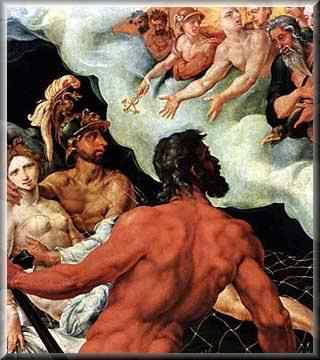
| The amused gods
refused to punish the trapped lovebirds, much to the
dismay of the cuckold Hephaestus. The female deities
declined to take part and the males were swayed by
Aphrodite's beauty. She "thanked" Hermes for
his help by sleeping with him and bearing Hermaphroditus. (I really liked hanging with cousin Hermaphroditus, but the poor thing was so confused after he joined up with that clinging Naiad Salmacis. He/she never knew whether she/he should enter the door marked GODS or GODDESSES at the Mount Olympus loo. More on him/her another time.) Until things cooled down in the tabloids, the embarrassed lovers went on separate vacations to the Greek Islands, but cousin Aphrodite had the last laugh on Helios, that big mouth. She made him fall in love with a mortal beauty called Leucothoe, daughter of Orchamus who was king of Persia. The anamoured Helios assumed the form of Leuchothoe's mother, dismissed the servants and then revealed his identity and proceeded to seduce the king's daughter. Man did that tick off the Oceanid Clytia, who had the hots for the sun god. Burning with jealousy and wrath, she told everyone of Helios' seduction of Leucothoe, making certain that her father, King Orchamus, got all the lurid details. This so incensed the king that he ordered his daughter buried alive. Poor girl, we all felt so badly for her, but there was nothing we could do. Cousin Aphrodite could be a real meanie sometimes. Aphrodite would often help young people in love: Atalanta, a virgin huntress, used to force her wooers to race before her, but if she caught them she would put them to death. If anybody survived she would marry him. (Now that's what I call a "killer date"! Rules like that can really put a damper on a girl's social life...No wonder her phone never rang!) Well, if you knew cousin Aphrodite at all, you just knew that Atalanta's reluctance to tramp around didn't sit well with her. 'What's that girl doing, killing Calydonian boars and running through woods hunting with the men, when there's such a much better reason to be in the company of males?' Aphrodite wondered. A man named Melanion (also known as Hippomenes) had a crush on beautiful Atalanta, but was astute enough to know he had no chance to beat her in the race. Aphrodite gave Melanion three golden apples, which he scattered on the ground as he ran. Atalanta could not help but stop to pick up the exquisite fruit, and was thus beaten in the race. (The myth of Atalanta is much more entertaining, and merits its own page. I will be posting this terrific story in the future.) But Aphrodite wasn't all lovey-dovey. She could be harsh to those who defied her, as we saw earlier with poor Leucothoe. Because the Lemnian women did not honor her, she inflicted a foul smell on them and caused their husbands to consort with Thracian women. The Lemnian women, abandoned by their husbands, killed all the men on the island and established a society of women. Men. Who needs them, I always say... When Aphrodite caught that idiot Ares in bed with Eos (Dawn), she cursed his lover with a constant longing for young mortals. When the Sirens refused to yield their virginity to either mortals or gods, Aphrodite turned them into birds. Should I go on? Her power was immense, and her victims included Helen, Medea, Ariadne, Phaedra and Hippodameia, to name but a few. Everywhere you turned, another beauty had bit the dust, compliments of dear cousin Aphrodite. Yes, it was wise indeed to respect the goddess of love. I remember Anchiles, one of her mortal lovers, bragging about his conquest of Aphrodite in a tavern while buzzed on cheap wine, causing Zeus to strike him dead with a thunderbolt for his impudence. Aphrodite set in motion the Trojan War. It goes like this: Eris (Discord) was not invited to a wedding (No kidding...who in their right mind would invite mean old Discord to their wedding? Wouldn't that be asking for trouble? She was my least-favourite aunt.) To gain revenge, Discord threw a golden apple among the invited guest, a prize to be given to the most beautiful woman present. (Ladies and gentlemen, I'm probably not the first person to bring this up, but what we have here is the first beauty pageant in recorded history.) To nobody's surprise, Hera, Athena and Aphrodite were the three finalists for the golden apple of Eris, and they asked Zeus to make the ultimate selection, but wise Zeus wanted nothing to do with the final decision... ("Talk about a lose-lose proposition," I heard Zeus muttering. "I don't pick my wife Hera, she castrates me! Athena's my favorite child, and she sure is beautiful, so I'd be tempted to award her the apple. But then there's Aphrodite, and wouldn't you know it, she's wearing that darn golden girdle again! What a babe! Oh my... What's a god to do?") So Zeus assigned the volatile task to a noble young prince from Troy named Paris, who was reputed to be an excellent judge of beauty. (Bob Barker wasn't available, I guess). Not willing to chance defeat, Aphrodite bribed Paris by promising him the hand of gorgeous Helen, never mind that at the time Helen was married to Menelaus, King of Sparta...just a minor inconvenience. |
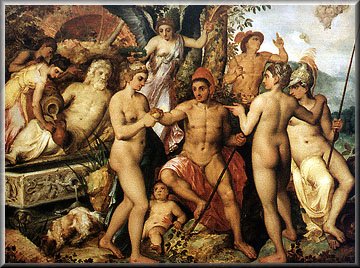
| Truth be told, all
three goddesses tried to bribe Paris. Athena promised to
make him forever victorious on the battlefield, and Hera
offered Paris kingship of the universe, complete with
palace, subjects and the whole nine yards. Tough choice,
yes? What would you do? The goddess of love's bribe worked, for Paris was stuck on Helen, who was said to be the most beautiful mortal alive (One day I caught a glimpse of Helen as she proudly stood on the walls of Troy, taunting and challenging the enraged Greeks to come and get her...Yes, she was a doll, but man was she ever full of herself. Thousand ships, and all that...) So Aphrodite got the golden apple of aunt Eris, Paris got the gorgeous Helen, and the ancient world got the Trojan War. The rest is history, the subject of many heroic and marvelous myths. Since I was there, I'll be able to give you an accurate feel for the subject when it comes time to talk of Troy. I wonder if they invited good old aunty Discord to the next wedding. Aphrodite also proved instrumental in determining the outcome of the Argonauts' quest for the Golden Fleece. At the request of Hera she made princess Medea fall in love with the hero Jason (he was such a jock!), which led to him getting the Fleece. More on that and the Trojan War another time. Aphrodite's love affair with handsome Adonis was fabled. Adonis was born when King Cinyras bragged that his daughter Smyrna (we used to call her Myrrha) was more beautiful than my cousin Aphrodite. To punish him, Aphrodite made the king insane and caused him to lie with his daughter. When he regained his sanity and realized what he had done, King Cinyras tried to kill Smyrna. Now there's a sane thing to do...as if it was his daughter's fault...oh, those Greeks! ( But hang on. Vile rumours circulated around Olympus that Smyrna herself was infatuated with her father, and that with her nanny's assistance they made him drunk and Smyrna had seduced him. Grandpa Hesiod, uncle Homer and the rest of the gang always quarreled over who was to blame. I well remember their animated debates down at Thanasi's Olympus Greek Restaurant, lasting till Eos (Dawn) showed up to spoil their party, or until the Apelia red wine finally ran out and Orpheus' lyre was stilled...) To save her, cousin Aphrodite turned Smyrna into a myrrh tree. Not to be denied, the king sliced this tree in half, and Adonis emerged from the split. Aphrodite was so moved by his beauty that she concealed the baby boy in a chest and entrusted him to my third cousin Persephone, who was queen of Hades, the Underworld. Bad move, in hindsight. Adonis grew to be quite the hunk (Hellenic People magazine named him Most Desired Bachelor for 16 straight years), and eventually my cousins Aphrodite and Persephone came to fight over his affections. You see, Persephone was also enamoured by Adonis' beauty, and refused to give him back. (I remember Hermes, the messenger god, discreetly showing me the following curt message from Persephone to Aphrodite regarding Adonis: "Dearest Aphro: I swore to Hermes that I wouldn't tell anyone that he showed me the memo, for at least a couple of thousand years. You can lose your job, you know. That's private mail.) Zeus sent the muse Calliope to decide the issue. Calliope ruled that each woman would have access to Adonis for one third of each year, and the remaining third would be Adonis' to spend alone (Giving poor, exhausted Adonis time to recover, I suppose, but he chose to spend his own third with Aphrodite. Must have been that golden girdle...) Calliope's custody ruling made jealous the god of war Ares, Aphrodite's jilted ex-lover. Ares turned himself into a giant boar and killed Adonis. Shame on him. What a jerk! (Even when I was a child, Ares was - and still is - the least favourite of all my Olympian relatives. I have tried hard to like the god of war, and I have failed miserably. He was such a brute! I can't wait to shred him to bits when his turn comes...) After Adonis' murder, cousin Aphrodite became enraged, since he was now spending the entire year with Persephone in the underworld. She beseeched Zeus, who ruled that Adonis' year would now be split in half; one part would be spent in the underworld, the other among the Olympians. Take that, Ares, you big boar! (I've often wondered if anyone bothered asking Adonis what he wanted. Not that he had much reason to complain, mind you, but sometimes it's hard being a sex symbol. Sure, it's nice being built like a Greek god, but do you get any respect? Noooo...I often wanted to ask him how he felt, but he was always so darn tired, what with the hunting and all.) |
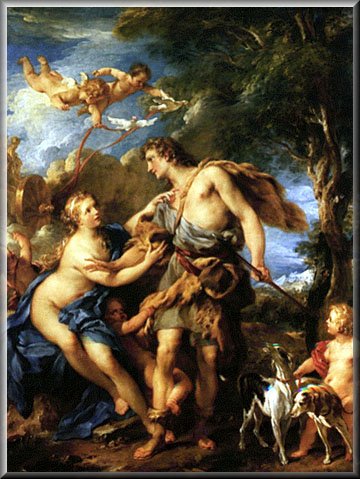
| In some versions
overheard late at night at Thanasi's Olympus, Aphrodite
tragically loses the love of her life. (Ladies, get the
hankies out.) All the time Aphrodite was with Adonis, she
sought only to please him. He was an avid huntsman and
many times she would leave her swan-drawn chariot, in
which she would effortlessly glide through the air, and
join him in the forests dressed like a huntress (I can
tell you she looked stunning in her fluorescent orange
hunting toga...) Aphrodite lived in constant fear of losing her Adonis, and had repeatedly warned him to stick to safer game when hunting. "Let those fools Perseus and Heracles play the macho games with the boars and the monsters, sweetie," I'd hear her say to him. "Now go out and bag us a couple of rabbits for dinner to go with this Ambrosia. And keep your darn dogs out of my temple until they become domesticated!" Sadly one day she wasn't with him and he tracked down a mighty boar (boars always got a bad rap in Greek mythology, for some ungodly reason). For hours he pursued the terrifying behemoth throughout the forests, reveling in the intense pleasure of the hunt. Eventually he brought the exhausted beast to bay with his hunting dogs and hurled his spear at it, but only wounded the animal. Before Adonis could spring away, the boar mad with pain rushed at him and gored him with its great tusks. High over the earth in her winged chariot, Aphrodite heard her lover's groans and flew to him. She kissed and cried to him as life softly left him, dark blood flowing down his skin of snow and his eyes growing heavy and dim. She sprinkled nectar on the drops of blood as it painted the earth deep crimson. And for the first time the goddess of love, who indiscriminately pierces the hearts of gods and men alike, knew how it felt to be herself wounded in the heart, a wound worse than even his... "You
die, O thrice desired, But I myself
must live who am a goddess The
mountains all were calling and the oak tree answering, A crimson flower sprang up where each drop of his blood had stained the earth. Every year the Greek maidens mourned for him and every spring they rejoiced when his flower, the blood-red anemone, the windflower, was seen blooming again. |
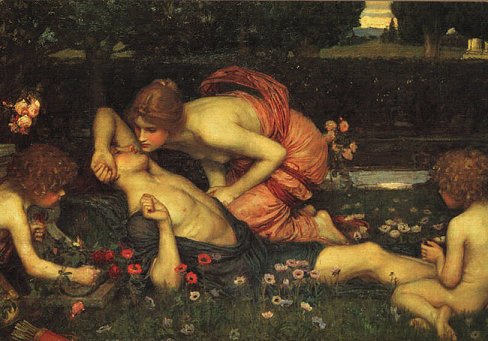
| Aphrodite's
entourage included my second favorite cousins,
the Charites, or Graces, who were the personifications of
charm and beauty in nature and in human life. They loved
all things beautiful and bestowed talent upon mortals.
Together with my beloved favorite cousins, the Muses,
they served as sources of inspiration in poetry and the
arts. Their names were Aglaia (Splendor), Euphrosyne (Mirth) and Thalia (Good Cheer), but to me they were cousins Aggi, Efi and Talli. What a pleasure it was just being with them. They are usually considered the daughters of Zeus and Eurynome, or Dionysus and Aphrodite, leading to more late night Apelia wine debates down at Thanasi's. Either way, you can bet my cousin Aphrodite and her retinue turned a few heads when they entered the room! Aphrodite's partner in crime was her darling son Eros (Love, Cupid), a very wicked and mischievous boy some say, lacking all manners. The brat spent his time in running all night from building to building, and with his love arrows breaking up respectable homes. Nobody was immune to his capricious nature, not even Zeus, in whom Eros often inspired sexual desires. (And how!) Some versions of Eros give him a primordial origin, a contemporary of Chaos, in existence long before Cronus and Zeus. God Eros came out of the egg which formed the earth and sky when it broke in two, wouldn't you know. When he made Gaea (Mother Earth) and Uranus (Heaven, Sky) embrace, their union produced many children. Bad news. The embraces of Heaven and Earth were too tight, and none of the children could rise towards the light until Cronus castrated his father. Stop me if you know the rest... Aphrodite's festival was the Aphrodisiac which was celebrated in various centers of Greece and especially in Athens and Corinth, the city that adopted her as their patroness. (Newly-found manuscripts, unearthed when in the name of progress the City of Corinth tore down some useless ancient ruins to build a fast-food restaurant, records the minutes of the Corinthian city council meeting passing that resolution: "Fellow Corinthian noblemen, after months of strenuous research, we have narrowed down our Patron search to two candidates, the great gods Hephaestus and Aphrodite. Every year we will hold a month-long festival worshipping and honoring all that our Patron stands for. We asked both gods to appear here today to state their case, and we are delighted that Aphrodite was able to make it. Hermes just delivered word that Hephaestus is still on his way, says he can only walk so fast. By the way, nice girdle, your majesty." Can you say "mismatch"? Does "blowout" ring any bells? It wasn't a pretty sight, poor Hephaestus had no chance. I can vouch to the authenticity of the Corinthian transcripts, I was there in disguise at her request, and I cast a vote for my cousin. Not that she needed it, but you know Aphro, she always covers her butt, in a manner of speaking.) Speaking of which, Aphrodite asked me to make it clear that her priestesses were not prostitutes but women who represented the goddess, and sexual intercourse with them was considered just one of the methods of worship. (Yeah, sure, tell it to the judge, lady...) My cousin Aphrodite's attributes are the dolphin, the dove, the swan, the pomegranate and the lime tree. In classical art, her connection to fertility is suggested through flowers and vegetation motifs. Those shameless Roman plagiarists called her Venus.
|
![]()
Web, myth narration & graphics created & maintained by
Nick Pontikis
Copyright © 1995 - 2003 Thanasi's Olympus Greek Restaurant
The Myth Man persona © 1988 Nick Pontikis
Copyright © 1999 mythman.com